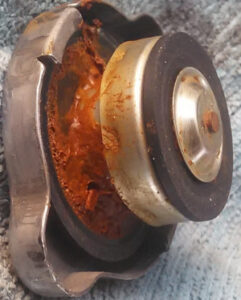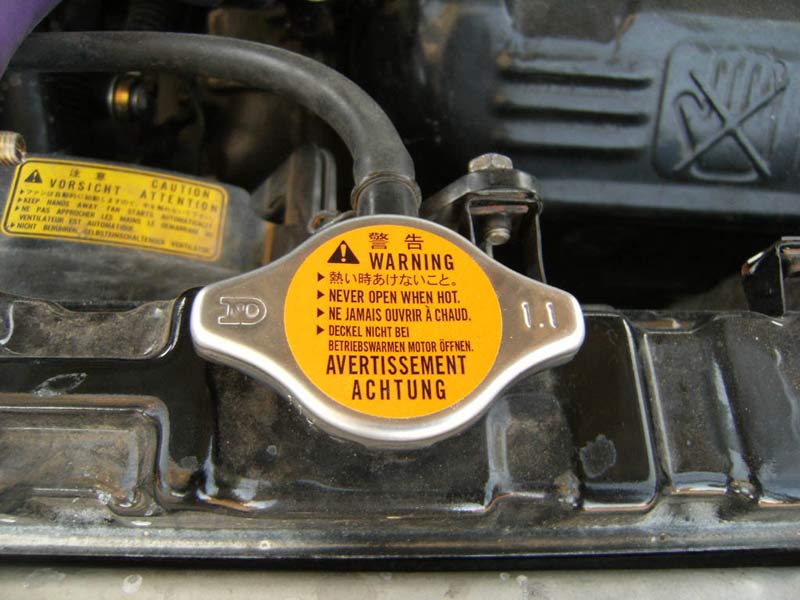What is a radiator cap?
The radiator cap is primarily a part of your car’s cooling system. It may be small, but it is very important. The radiator transfers excess heat from the engine’s coolant fluid and releases it into the air. This is a component of the mechanisms that keep your engine from overheating.

A rusty radiator cap.
The engine expands and fills with pressure when the engine coolant is at high temperature. Pressurizing the engine coolant means that it will boil at a higher temperature, allowing your engine to run slightly hotter. Because of this, radiator caps often have pressure ratings.
The radiator cap also acts as a release valve set to open at the maximum engine coolant pressure point.
When the engine coolant pressure reaches this level, the radiator cap valve is forced open. This causes the engine coolant to overflow into the radiator expansion tank(s) located to the side of the radiator. The engine coolant remains in the expansion tank until it reaches a lower temperature and is drawn back into the radiator. From here, it continues to flow around your engine, allowing for correct engine temperature at all times.
Why do radiator caps rust? How do I know if my radiator cap is rusty?
Because the radiator is made of metal, naturally it is not immune to rust. Nowadays, most radiator designs use a plastic top instead of metal which is the area most prone to rusting, but inside the metal radiator is still exposed to moisture.
To know if your radiator cap is rusty, when the engine is off and cold, you can open the hood to see the radiator cap. If excess rust is present on and around the radiator cap, such as on radiator core tubes or holes, it likely needs to be replaced. You can also remove the the radiator cap to check for coolant level and color. A brownish fluid would mean excessive rust inside the cooling system, which would also indicate the radiator cap needs to be replaced.
There are ways to prevent excess rust from building up inside the radiator. The main way to do this is to find an engine coolant that works best for your car. Generally, you should use high quality coolant or anti freeze mixed with an appropriate amount of distilled water. It is important not to fill your radiator with tap water. This can worsen the rust in your cooling system as the metal parts require distilled water and coolant.
Why do rusted radiator caps need to be fixed?
While radiator caps may be a simple part of your car’s cooling system, their functionality being up to standard is vitally important. Because these parts are crucial to the car’s cooling efficiency, ignoring a faulty radiator cap can cause overheating and even permanent engine damage which is far more costly.
The release valve function of the radiator cap means that it also generally is a way for pressure to release. Without it, pressure would continue building up in the engine, which could cause sudden explosions or leaks.
Rust is not the only damage the radiator cap can suffer. See more symptoms of a bad radiator cap here.
New radiator cap in Hamilton
Is your radiator cap rusted and in need of a replacement? We can help!
At Grimmer Motors, we can remove and replace your radiator cap (if needed), reducing the risks of coolant leaks or engine overheating.
For all your radiator cap and cooling system repairs in Hamilton by qualified and skilled mechanics, contact Grimmer Motors today!

